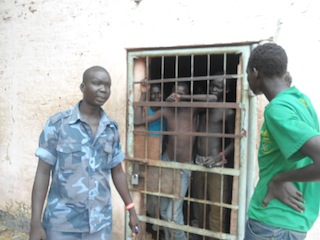Sudan committed the highest number of executions in Africa in 2012
April 10, 2013 (LONDON) – In 2012 the Sudanese judicial system carried out more executions than any other country in Africa, according to Amnesty International’s annual report into the death penalty.

Sudan and South Sudan are among an “isolated group of countries” that defy the trend towards abolition of the death penalty, the human rights group said.
“The regression we saw in some countries this year was disappointing, but it does not reverse the worldwide trend against using the death penalty. In many parts of the world, executions are becoming a thing of the past,” Amnesty International’s Secretary General, Salil Shetty, said in a statement.
“Only one in 10 countries in the world carries out executions. Their leaders should ask themselves why they are still applying a cruel and inhumane punishment that the rest of the world is leaving behind.”
The report says that, despite a few positive developments, the use of the death penalty in the Middle East and North Africa is still a cause of great concern.
“Governments still executing have run out of arguments to justify themselves. There is no evidence whatsoever to indicate that the death penalty works as a special deterrent against crime,” said Shetty.
“The real reason for the death penalty’s use can often be found elsewhere. In 2012, we were once again very concerned to see countries executing for what appeared to be political purposes – either as a populist measure, or as an outright tool of repression.”
SUDAN PASSES 119 DEATH SENTENCES
At least 199 death sentences were reported in Sudan, including two women who were convicted of “adultery while married” and sentenced to death by stoning in separate cases in May and July.
The women, Intisar Sharif Abdallah and Layla Ibrahim Issa Jumul, were both sentenced after “unfair trials involving forced confessions” Amnesty said, noting that the women were released on appeal after their sentences were overturned.
Amnesty’s report also claims that in 2012 the Sudanese authorities “continued to use the death penalty, and wide-ranging powers under the 2010 National Security Act, to oppress real or perceived activists of political opposition groups. Al-Tom Hamed Tutu, a member of the armed opposition group Justice and Equality Movement in Darfur, western Sudan, was sentenced to death by hanging in 2011 for crimes against the state. The government had accelerated the legal process by filing appeals without informing him or his lawyer. The execution was suspended in June pending an appeal to the Constitutional Court.”
The death penalty has also been used in the context of the conflict in South Kordofan, which broke out between rebels and the government in 2011 following contested election and the failure to implement a 2005 peace deal before South Sudan separated from Sudan in July that year.
In the run up to South Sudan’s independence the government demanded that Sudan People’s Liberation Army-North (SPLA-N), the armed branch of the Sudan People’s Liberation Movement-North (SPLM-N), disarm of move south of the new international border.
Amnesty’s report states that the human rights watch dog believes that at least one member of the SPLM-N has been charged with crimes that carry the death penalty because of her attempts to provide humanitarian to areas of South Kordofan controlled by the SPLA-N.
The report says:
Sudanese teacher and activist Jalila Khamis Koko, a Nuba from Southern Kordofan and a member of SPLM-N, volunteered to provide humanitarian support to people who had fled their homes in Southern Kordofan. In the same month – June 2011 – she appeared in a Youtube video in which she denounced the conditions in conflict-affected areas and called for a ceasefire. She was arrested in March 2012, and remained detained for the rest of the year, without charge and, for a time, in solitary confinement. Jalila Khamis Koko was charged with five criminal counts on 13 December, two of which – “undermining the constitutional system” and “waging war against the state” – carry the death penalty. Amnesty International believes that she was detained because of her humanitarian work and peaceful expression of her views.
FIVE EXECUTED IN SOUTH SUDAN
Amnesty International’s report also highlighted the continued use of the death penalty in South Sudan “despite well-documented weaknesses” in the legal system of the less-than-two-year-old country.
The report says that at least five executions took place in South Sudan last year, two in Juba prison on 28 August and three in Western Bahr el Ghazal’s Wau Prison on 6 September.
By the end of 2012, more than 200 prisoners were being kept on death row in South Sudan, “shackled and crowded into cramped and dirty cells”. The report added that “vast majority of prisoners on death row were not represented by counsel in trials that often lasted only minutes.”
Under South Sudanese law the Supreme Court has to review and confirm all death sentences and South Sudan’s President Salva Kiir must approve all executions before they take place.
The issue of the death penalty, the government said in November last year, will be included in the new nation’s stalled constitutional review process, which aims to introduce a permanent constitution to replace the transitional document adopted upon independence from Sudan.
On September 28, Riek Puok Riek, South Sudan’s permanent representative in Geneva told the UN Human Rights Council in Geneva that “South Sudan agrees with … the logic of abolishing the death penalty. But we believe that this is a process that could be approached gradually.”
(ST)
